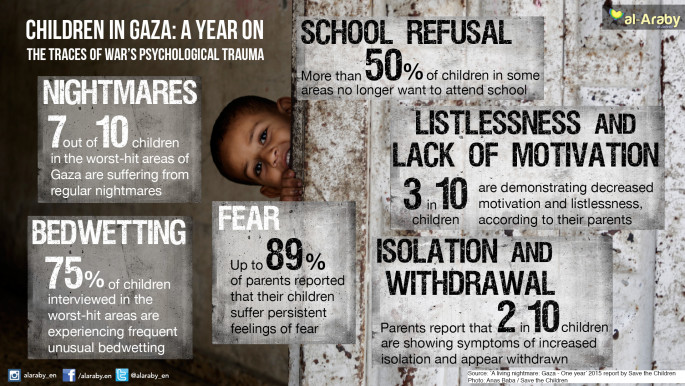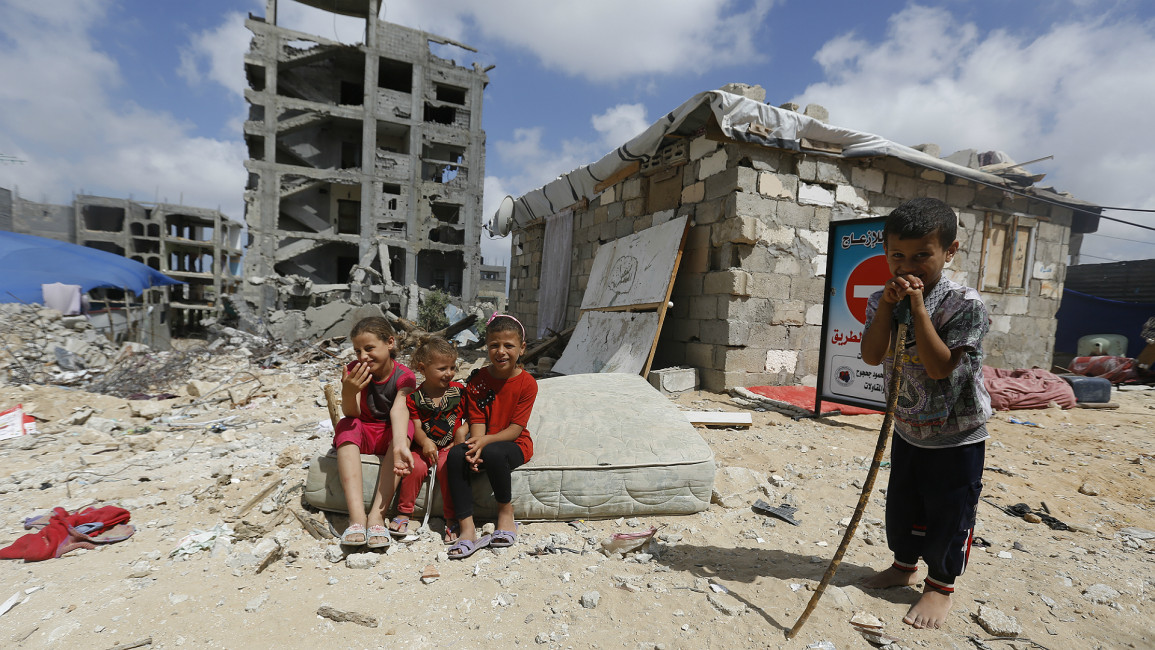Traumatised Gaza children 'live in fear'
A year on from the Gaza war, children living in the hardest-hit areas are still showing signs of severe emotional distress and trauma, while living in fear of further fighting.
During last summer's 51-day war, over 500 children in Gaza were killed and 3,436 were injured, while an estimated 1,500 lost their parents.
Over 80 percent of parents reported that their children now suffer from consistent feelings of fear, many worrying about another war, while half do not want to attend school because they are afraid to leave their homes.
"Why do Gaza's children have no rights?" a 14-year-old boy asked.
"Why does no one feel our pain? All the children here need psychiatric help. Our future is gone. I want one human to come and live in Gaza for just two hours to feel what we feel" he said.
More than 70 percent of children in the worst-affected areas of Gaza now suffer from bed wetting and regular nightmares, a new study by Save the Children revealed.
In some areas, the problem is so severe that children suffer from nightmares every single night.
"During the war, my children saw body pieces in the street after a shelling," one father said.
"My son is now traumatised and my daughter has nightmares and wakes up frightened. I don't know what to do."
Some children who have had to move to new areas after their homes were destroyed, now feel too anxious to try and make new friends, the report revealed.
Parents added that their children were showing symptoms of increased isolation and appeared to be withdrawn.
"Many children in Gaza have now lived through three wars in the past seven years, the last one notable for its brutality" Carolyn Miles, president and CEO of Save the Children said.
"They are emotionally and, in some cases, physically shattered."
 |
Why does no one feel our pain? I want one human to come and live in Gaza for just two hours to feel what we feel |  |
Israeli blockade
The war led to a widespread destruction of homes, schools and other buildings.
Around 100,000 people are still homeless, while major reconstruction of health facilities, water networks and schools has yet to begin.
A 12-year-old girl said "We saw our home being destroyed. I was crying because we have memories and dreams there, from the day of our birth. Everything is gone. I can't live, I only feel pain."
Earlier this year, the charity Oxfam stated that rebuilding Gaza could take a century to complete unless the Israeli blockade is lifted.
These restrictions on the movement of people and goods in and out of Gaza has had a negative impact on children's day-to-day lives as well as their health, the charity found, with many feeling trapped and unable to escape Gaza.
The Gaza Strip has almost no industry, with exports banned under the Israeli blockade.
Some 39 percent of the population live below the poverty line.
Even before last year's war, two-thirds of the population depended on food aid and more than 40 percent were unemployed.
Mental trauma
"The results of this survey are extremely alarming for those of us who work with children in Gaza," said David Hassell, Co-Country Director for Save the Children.
"They have lived through events that would give even the most hardened adult nightmares. The continued blockade and threat of renewed conflict makes it very difficult for children to recover from the trauma they have experienced" he added.
But with only one hospital dedicated to mental health in Gaza, and with no children's wards in it, recovering from this trauma can prove to be a far more difficult task.
"Out of my five daughters, the only one uninjured was Nada, and now she doesn't talk" another father said. "She cries a lot. She is exhausted all the time and suffers from nightmares."
The children's charity has called for Israel to lift the blockade to enable psychological staff to move in and out of Gaza freely in order to help children recover from the trauma they have been through.
"The world cannot sit by and watch while these children’s hopes for a better future are crushed by the blockade and the looming threat of another conflict" Hassell said.
"Political leaders on all sides should stop posturing and start acting – they need to work together to agree to a plan for a lasting peace deal that includes ending the blockade on Gaza."
 |
|
| Click here for larger image |



